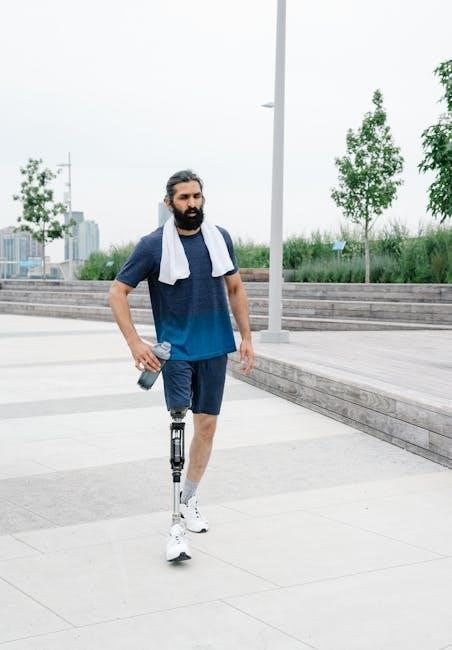
In a changing society, health choices are shaped by individual, interpersonal, and societal factors. Your Health Today offers a comprehensive guide to understanding these influences and making informed decisions for well-being.
The Importance of Understanding Health in Modern Society
Understanding health in modern society is crucial for making informed decisions that promote well-being. With the rise of technology and access to information, individuals can now take a more active role in managing their health. Your Health Today emphasizes the interconnectedness of personal choices and societal influences, such as environmental factors and cultural beliefs. By recognizing how individual actions impact overall health, people can adopt healthier lifestyles and contribute to public health initiatives. This understanding also fosters empathy and responsibility, enabling individuals to support others in their health journeys. In a rapidly changing world, staying informed about health trends and challenges is essential for navigating personal and societal well-being effectively.
The Impact of Societal Changes on Personal Health
Societal changes significantly influence personal health, shaping behaviors, access to resources, and overall well-being. Advances in technology and urbanization have altered lifestyles, often increasing stress and sedentary behaviors. Cultural shifts and economic factors also play a role, affecting nutrition, physical activity, and mental health. For instance, the rise of fast food and digital entertainment has contributed to health challenges like obesity and decreased physical activity. Additionally, societal norms around substance use and mental health awareness have evolved, impacting individual choices. Understanding these changes is crucial for adapting health practices and promoting resilience in a dynamic world.
Overview of Key Health Topics in “Your Health Today”
Your Health Today covers essential health topics, focusing on nutrition, fitness, mental health, substance abuse, sexual health, and infectious diseases. It emphasizes social responsibility and the impact of societal changes on personal well-being. The book explores how individual choices intersect with broader environmental and cultural factors, providing a holistic view of health. By addressing current issues and promoting informed decision-making, Your Health Today equips readers with practical tools for navigating health challenges in a changing world. Its student-focused approach includes engaging features like photos, graphs, and discussions to foster understanding and dialogue about key health topics.

Individual Factors Influencing Health Choices
Individual factors such as physical activity, nutrition, and mental well-being significantly impact health choices. Personal decisions, shaped by lifestyle and awareness, influence overall well-being and longevity.
The Role of Physical Activity in Maintaining Health
Physical activity plays a vital role in maintaining overall health by reducing the risk of chronic diseases, improving mental well-being, and enhancing physical function. Engaging in regular exercise, such as walking, cycling, or team sports, promotes cardiovascular health, strengthens muscles, and boosts immunity. It also contributes to better mental health by reducing stress and anxiety, while improving sleep quality. Encouraging communities to create accessible and enjoyable exercise opportunities fosters a culture of wellness. By incorporating physical activity into daily routines, individuals can take personal responsibility for their health, leading to a more balanced and fulfilling life. Regular movement is essential for long-term well-being and quality of life;
Nutrition and Dietary Choices for Optimal Well-being

Nutrition is a cornerstone of optimal well-being, influencing both physical and mental health. A balanced diet rich in fruits, vegetables, whole grains, lean proteins, and healthy fats supports energy levels, immune function, and overall vitality. Poor dietary choices can lead to chronic diseases, such as obesity and diabetes, while a nutritious diet helps prevent these conditions. Additionally, proper nutrition enhances mental health by reducing the risk of anxiety and depression. Educating individuals about healthy eating habits and providing accessible resources empowers them to make informed choices. By prioritizing nutrition, individuals can maintain a healthy lifestyle and improve their quality of life in a changing society. Nutrition is a key factor in achieving long-term well-being.
Mental Health and Well-being in a Changing World
Mental health is a critical aspect of overall well-being, influenced by societal changes and personal experiences. In today’s fast-paced world, stress, anxiety, and depression are prevalent concerns. Factors such as social media, economic pressures, and isolation can impact mental health. Building resilience and adopting healthy coping mechanisms are essential. Prioritizing mental well-being involves seeking support, maintaining a balanced lifestyle, and engaging in activities that promote relaxation and joy. A changing society requires adaptive strategies to address mental health challenges. By fostering awareness and reducing stigma, individuals can take proactive steps toward maintaining their mental well-being. Mental health is as vital as physical health in achieving a fulfilling life.
Substance Abuse and Addiction: Personal and Societal Impact
Substance abuse and addiction pose significant challenges to individuals and society, affecting physical and mental health, relationships, and productivity. The personal impact includes increased risk of chronic diseases, mental health disorders, and impaired judgment, leading to accidents or unsafe behaviors. Societal consequences include heightened healthcare costs, strained legal systems, and lost economic potential due to reduced workforce participation. Addressing these issues requires comprehensive strategies, such as education, prevention programs, and accessible treatment options. Early intervention and support systems are crucial for recovery and reducing the broader societal burden. Understanding the root causes of addiction is key to fostering healthier communities and promoting long-term well-being.
Sexual Health and Responsible Decision-Making
Sexual health is a critical aspect of overall well-being, requiring responsible decision-making to ensure physical and emotional safety. Education plays a vital role in empowering individuals to make informed choices about sexual activity, consent, and contraception. Understanding the risks of sexually transmitted infections (STIs) and unintended pregnancies highlights the importance of protection and communication with partners. Societal norms and personal values often influence these decisions, making it essential to prioritize open dialogue and mutual respect. By fostering a culture of responsibility and awareness, individuals can navigate their sexual health confidently, contributing to healthier relationships and communities.

Social and Cultural Influences on Health
Social and cultural factors significantly influence health choices, shaping behaviors and access to resources. Understanding these dynamics is crucial for addressing health disparities and promoting equitable well-being.
Social Determinants of Health and Their Effects
Social determinants of health, such as education, income, and environment, profoundly impact well-being. These factors influence access to resources, healthcare quality, and opportunities for healthy living. Education enhances health literacy, enabling informed choices. Economic stability provides access to nutritious food and safe housing, reducing health risks. Environmental conditions, like air and water quality, directly affect physical and mental health; Understanding these determinants helps address disparities, promoting equitable health outcomes. By addressing these upstream factors, societies can create supportive environments for all individuals to achieve optimal health and well-being, fostering a healthier future for everyone.
Family and Community Impact on Health Decisions
Family and community play a significant role in shaping health decisions, influencing behaviors, and providing support. Family dynamics, cultural beliefs, and social norms often dictate health priorities and practices. Communities provide access to resources, services, and environments that promote or hinder healthy choices. Strong familial and community ties can encourage healthy behaviors, such as regular physical activity or balanced nutrition. Conversely, societal pressures or limited access to resources can create barriers to optimal health. Understanding these influences helps individuals make informed decisions aligned with their values and circumstances. By fostering supportive environments, families and communities can collectively promote well-being and resilience.
Socioeconomic Status and Its Role in Health Outcomes
Socioeconomic status (SES) significantly influences health outcomes, shaping access to resources, environments, and opportunities. Individuals with higher SES often enjoy better health due to access to quality healthcare, nutritious food, and safe living conditions. Conversely, lower SES is linked to limited resources, poor nutrition, and exposure to environmental hazards, exacerbating health disparities. Education and income levels also impact health literacy and decision-making. These factors contribute to inequities in health outcomes, highlighting the need for policies addressing systemic disparities. Understanding SES’s role is crucial for creating interventions that promote equitable access to health resources and improve overall well-being across all socioeconomic groups.
Cultural Beliefs and Practices in Health Choices
Cultural beliefs and practices profoundly influence health choices, shaping decisions about diet, medical treatments, and lifestyle. Many individuals rely on traditional remedies and alternative therapies rooted in their cultural heritage. For example, some cultures emphasize herbal medicine or spiritual healing, while others prioritize community and family involvement in health decisions. Societal changes, such as globalization, can challenge these practices, leading to a blend of traditional and modern approaches. Understanding these cultural dynamics is essential for developing healthcare strategies that respect individual values and promote effective care; By acknowledging the role of culture, individuals and healthcare providers can foster more inclusive and personalized health practices that honor diverse perspectives and improve overall well-being.

Environmental Factors and Health
Environmental factors significantly influence health, with air and water quality affecting well-being. Urbanization impacts health decisions, while access to green spaces promotes physical activity and mental well-being.
Air and Water Quality: Impact on Public Health
Air and water quality play a crucial role in public health, as poor air quality contributes to respiratory and cardiovascular diseases. Pollution from industrial activities and vehicle emissions exacerbates these issues, while access to clean water prevents diseases like cholera and dysentery. Urbanization often leads to reduced air quality and limited access to safe water, disproportionately affecting vulnerable populations. Green spaces and proper waste management can mitigate these challenges, promoting healthier environments. Understanding these environmental factors is essential for making informed health choices and advocating for policies that improve air and water quality. Addressing these issues is vital for ensuring the well-being of communities in a changing society.
Access to Green Spaces and Their Benefits
Access to green spaces significantly impacts public health by promoting physical and mental well-being. Green spaces, such as parks and gardens, encourage physical activity, reduce stress, and improve air quality. They also foster social connections, enhancing community cohesion. Urban areas often face challenges in providing equitable access to green spaces, disproportionately affecting low-income populations. Encouraging the creation of accessible and enjoyable green spaces can help address health disparities. These areas not only provide recreational opportunities but also serve as buffers against the negative effects of urbanization, such as heat islands and pollution. Promoting green spaces is a vital strategy for healthier, more sustainable communities in a changing society.
The Impact of Urbanization on Health
Urbanization has profoundly transformed how societies function, bringing both opportunities and challenges for health. The concentration of populations in cities often leads to increased exposure to pollution, overcrowding, and noise, which can exacerbate respiratory and cardiovascular diseases. Mental health is also affected, with higher rates of stress, anxiety, and depression linked to urban living. However, urban areas often provide better access to healthcare facilities, recreational spaces, and economic opportunities. The availability of green spaces and community resources can mitigate some negative effects. Balancing urban growth with sustainable planning is crucial to promoting healthier environments and addressing disparities in health outcomes for city dwellers.

The Role of Technology in Health Choices
Technology transforms health monitoring and care access, enabling informed decisions through wearable devices, telemedicine, and digital platforms, while shaping modern approaches to personal and societal well-being.

Wearable Technology and Health Monitoring
Wearable technology has revolutionized health monitoring by enabling real-time tracking of physical activity, heart rate, sleep patterns, and other vital signs. These devices empower individuals to make informed health choices, fostering a culture of preventive care. By providing personalized data, wearables promote accountability and encourage healthier lifestyles. Integration with telemedicine platforms enhances accessibility to healthcare services, making it easier for individuals to manage chronic conditions and seek professional advice remotely; This fusion of technology and health not only improves personal well-being but also supports broader public health initiatives, demonstrating the transformative potential of innovation in healthcare.
Telemedicine and Digital Health Platforms
Telemedicine and digital health platforms have transformed healthcare accessibility, enabling remote consultations and monitoring. These technologies allow individuals to receive medical advice and manage chronic conditions from home, reducing the need for in-person visits. Digital platforms also facilitate data sharing between patients and healthcare providers, improving care coordination. The rise of telemedicine has been particularly impactful in rural areas and for those with mobility challenges. By integrating with wearable devices, digital health platforms provide comprehensive health monitoring, empowering users to take charge of their well-being. This shift not only enhances convenience but also aligns with the broader societal shift toward preventive and personalized healthcare, as highlighted in Your Health Today.

Personal Responsibility for Health
Personal responsibility for health involves making informed choices to promote well-being. It empowers individuals to prioritize self-care, set goals, and advocate for their needs in a changing society.
Goal Setting for Healthy Behaviors
Goal setting is a powerful tool for adopting healthy behaviors and maintaining them over time. By defining clear, specific, and achievable objectives, individuals can create a roadmap for improving their well-being. Setting SMART (Specific, Measurable, Achievable, Relevant, Time-bound) goals helps ensure success. For example, instead of vowing to “eat healthier,” a goal might be to “include five servings of fruits and vegetables in daily meals for the next three months.” Regularly monitoring progress and celebrating milestones can reinforce motivation. Incorporating accountability, such as sharing goals with a friend or using a tracking app, further enhances commitment. Effective goal setting empowers individuals to take control of their health choices and foster lasting positive change in a changing society.
The Importance of Self-Advocacy in Healthcare
Self-advocacy in healthcare is crucial for ensuring individuals receive appropriate and personalized care; It involves actively communicating needs, preferences, and concerns to healthcare providers. By taking an empowered approach, patients can make informed decisions that align with their values and improve health outcomes. Self-advocacy also helps address societal and systemic barriers, such as access to care or cultural biases, which may impact health choices. Educating oneself about health conditions, treatments, and rights fosters confidence and promotes better dialogue with providers. In a changing society, self-advocacy becomes even more vital, enabling individuals to navigate complex healthcare systems effectively and advocate for their well-being.

Economic Factors and Health Decisions
Economic status significantly influences health choices, as costs affect access to care, treatments, and preventive services. Financial constraints often limit options, impacting overall well-being and health outcomes.
Healthcare Costs and Accessibility
Healthcare costs play a pivotal role in shaping health decisions. Rising expenses often limit access to essential services, particularly for low-income individuals. Your Health Today emphasizes that financial barriers can delay treatments, exacerbating health issues. Accessibility varies widely, with socioeconomic status influencing the quality of care received. Insurance coverage, out-of-pocket expenses, and geographic location further complicate the ability to seek timely medical help. These factors collectively highlight the need for affordable and equitable healthcare systems to ensure all individuals can maintain their well-being without financial hardship. Addressing these challenges is crucial for promoting healthier societies and reducing disparities in health outcomes.
The Role of Workplace Wellness Programs
Workplace wellness programs play a significant role in promoting employee health and productivity. These initiatives often include stress management, physical activity, and nutrition seminars, fostering a healthier work environment. By encouraging preventive care and healthy behaviors, such programs can reduce chronic disease risks and improve overall well-being. Employers benefit from lower healthcare costs and increased employee satisfaction, while employees gain tools to manage their health effectively. Your Health Today highlights the importance of these programs in addressing modern workforce challenges, emphasizing their alignment with broader societal health goals. They serve as a proactive approach to enhancing both individual and organizational well-being in a changing society.

Future Trends in Health Choices
Emerging technologies and innovations are reshaping health choices, offering personalized solutions and improved accessibility to care, ensuring better health outcomes in a rapidly evolving world.
Emerging Technologies and Innovations in Health
Emerging technologies are revolutionizing health choices, offering innovative solutions for disease prevention, diagnosis, and treatment. Wearable devices and telemedicine are enhancing accessibility to healthcare, enabling individuals to monitor their health in real-time and seek remote consultations. Advances in artificial intelligence (AI) are paving the way for personalized medicine, tailoring treatments to individual needs. Digital health platforms are also empowering users to make informed decisions by providing data-driven insights. These innovations are not only improving health outcomes but also fostering a more proactive approach to wellness. As technology continues to evolve, it will play a pivotal role in shaping future health trends and promoting healthier lifestyles globally.
The Role of AI in Personalized Medicine
Artificial intelligence (AI) is transforming personalized medicine by enabling tailored treatments based on individual genetic, environmental, and lifestyle factors. AI algorithms analyze vast amounts of health data to predict disease risks and recommend targeted therapies. This approach enhances precision in diagnosis and treatment, reducing trial-and-error in healthcare. For instance, AI-driven tools can identify genetic markers for specific conditions, allowing for early interventions. Additionally, AI streamlines clinical decision-making by providing evidence-based recommendations. Personalized medicine, supported by AI, empowers individuals to take proactive roles in their health management, leading to better outcomes and improved quality of life. This integration of technology and healthcare is reshaping how we approach wellness and disease prevention.
Empowering individuals to make informed health choices is essential in today’s evolving society. Prioritize well-being by embracing education, self-advocacy, and community support to foster a healthier future for all.
Encouraging Healthy Choices in Daily Life
Encouraging healthy choices in daily life involves promoting awareness and accessibility to resources that support well-being. Individuals can start by setting realistic goals, such as incorporating physical activity into routines or making balanced dietary decisions. Education plays a crucial role in empowering people to understand the impact of their choices on long-term health. Communities can foster healthy environments by advocating for accessible green spaces, affordable nutrition, and mental health support. By prioritizing health literacy and creating supportive systems, societies can inspire individuals to adopt lifestyles that promote overall well-being and resilience in a changing world.
Advocating for Health-Focused Policy Changes
Advocating for health-focused policy changes is essential to create environments that support well-being for all. Policies addressing healthcare accessibility, environmental safety, and substance abuse prevention are critical. Organizations like the National Institute on Drug Abuse and the Foundation for Alcohol Research and Education (FARE) work to influence legislation and public health initiatives. Individuals can contribute by engaging in activism, supporting research, and participating in community efforts to promote healthy living. By advocating for policies that prioritize health, societies can address disparities and ensure equitable access to resources, fostering a culture of wellness and sustainability in a changing world.